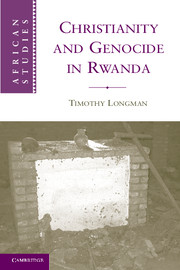Book contents
- Frontmatter
- Contents
- Acknowledgments
- Christianity and Genocide in Rwanda
- INTRODUCTION
- PART I “RIVER OF BLOOD”: RWANDA'S NATIONAL CHURCHES AND THE 1994 GENOCIDE
- 2 “Render Unto Caesar and Musinga …”: Christianity and the Colonial State
- 3 The Churches and the Politics of Ethnicity
- 4 “Working Hand in Hand”: Christian Churches and the Postcolonial State (1962–1990)
- 5 “Giants with Feet of Clay”: Christian Churches and Democratization (1990–1992)
- 6 “It Is the End of the World”: Christian Churches and Genocide (1993–1994)
- PART II “GOD HAS HIDDEN HIS FACE”: LOCAL CHURCHES AND THE EXERCISE OF POWER IN RWANDA
- CONCLUSION
- Bibliography
- Index
- Titles in the series
2 - “Render Unto Caesar and Musinga …”: Christianity and the Colonial State
Published online by Cambridge University Press: 03 May 2010
- Frontmatter
- Contents
- Acknowledgments
- Christianity and Genocide in Rwanda
- INTRODUCTION
- PART I “RIVER OF BLOOD”: RWANDA'S NATIONAL CHURCHES AND THE 1994 GENOCIDE
- 2 “Render Unto Caesar and Musinga …”: Christianity and the Colonial State
- 3 The Churches and the Politics of Ethnicity
- 4 “Working Hand in Hand”: Christian Churches and the Postcolonial State (1962–1990)
- 5 “Giants with Feet of Clay”: Christian Churches and Democratization (1990–1992)
- 6 “It Is the End of the World”: Christian Churches and Genocide (1993–1994)
- PART II “GOD HAS HIDDEN HIS FACE”: LOCAL CHURCHES AND THE EXERCISE OF POWER IN RWANDA
- CONCLUSION
- Bibliography
- Index
- Titles in the series
Summary
To explain how churches came to be so deeply implicated in the Rwandan genocide requires reviewing the history of Christian involvement in Rwandan society and politics. In the earliest days of Christian missionary activity, a conflict arose between the missionaries who believed that the expansion of Christianity was best promoted through a close alliance of churches with the state and others who believed that the Christian message required the churches to ally themselves with the poor and marginalized. The fact that the first group prevailed in both the Roman Catholic and most Protestant churches has had a determinative impact on the nature of Christianity in Rwanda, where, despite consistent voices of dissent, a close collaboration between churches and the state has been the norm. The entanglement of churches in ethnic politics also has roots in the earliest days of the Christian presence in Rwanda and has profoundly shaped the nature of Christianity.
In this chapter, I present an historical overview of Christian church history in Rwanda from the appearance of the first Catholic missionaries in 1900 to the deposition of King Musinga, an event over which the missionaries had great influence and after which the church entered into a period of exceptional expansion. As I attempt to demonstrate, Catholic Church leaders committed themselves from their arrival in Rwanda to becoming important political players. They interpreted Rwandan power relations in ethnic terms and set as their primary goal gaining the support and ultimately the conversion of the Tutsi group.
- Type
- Chapter
- Information
- Christianity and Genocide in Rwanda , pp. 33 - 57Publisher: Cambridge University PressPrint publication year: 2009



